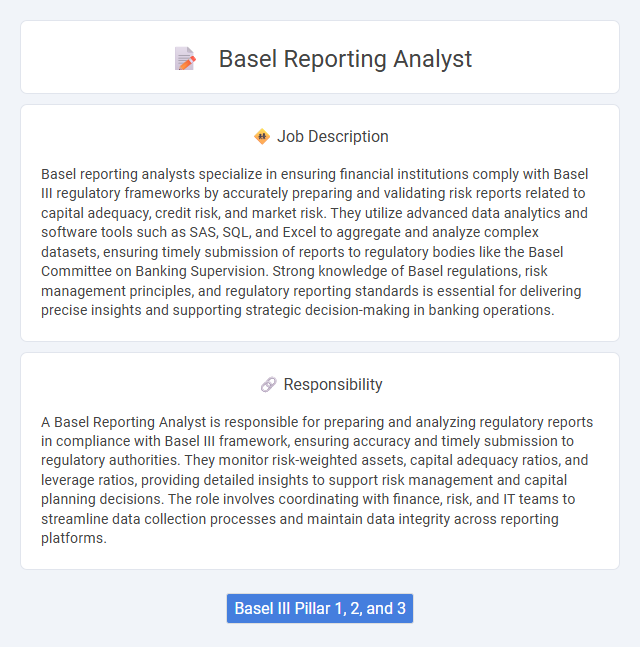
Basel reporting analysts specialize in ensuring financial institutions comply with Basel III regulatory frameworks by accurately preparing and validating risk reports related to capital adequacy, credit risk, and market risk. They utilize advanced data analytics and software tools such as SAS, SQL, and Excel to aggregate and analyze complex datasets, ensuring timely submission of reports to regulatory bodies like the Basel Committee on Banking Supervision. Strong knowledge of Basel regulations, risk management principles, and regulatory reporting standards is essential for delivering precise insights and supporting strategic decision-making in banking operations.
Individuals with strong analytical skills and attention to detail are likely well-suited for a Basel reporting analyst role, as the job requires precise data interpretation and regulatory compliance understanding. People who thrive in structured environments and have a background in finance, risk management, or regulatory frameworks may find this position compatible with their strengths. Conversely, those who struggle with complex regulations or prefer less regimented tasks might face challenges in adapting to the demands of Basel reporting analysis.
Qualification
A Basel reporting analyst typically requires strong knowledge of Basel III regulations, risk management principles, and financial reporting. Proficiency in data analysis tools such as SQL, Excel, and regulatory reporting software is essential. Candidates often have a background in finance, economics, or accounting, along with experience in regulatory compliance and risk assessment within the banking sector.
Responsibility
A Basel Reporting Analyst is responsible for preparing and analyzing regulatory reports in compliance with Basel III framework, ensuring accuracy and timely submission to regulatory authorities. They monitor risk-weighted assets, capital adequacy ratios, and leverage ratios, providing detailed insights to support risk management and capital planning decisions. The role involves coordinating with finance, risk, and IT teams to streamline data collection processes and maintain data integrity across reporting platforms.
Benefit
A Basel reporting analyst role likely offers substantial benefits including enhanced expertise in regulatory compliance and risk management frameworks. Candidates may gain valuable experience working with complex financial data, increasing their marketability in the finance sector. Opportunities for career growth and competitive compensation are probable advantages tied to this specialized position.
Challenge
The Basel reporting analyst role likely involves navigating complex regulatory frameworks, requiring a strong grasp of Basel III and IV standards to ensure accurate risk and capital reporting. Challenges may arise from the need to interpret evolving compliance requirements and integrate disparate data sources into cohesive reports. The position probably demands continuous adaptation to regulatory updates and collaboration with cross-functional teams to maintain data integrity and reporting accuracy.
Career Advancement
A Basel reporting analyst plays a critical role in ensuring regulatory compliance and accurate financial reporting under Basel III and IV frameworks. Mastery of risk management, capital adequacy, and regulatory requirements opens pathways to senior risk analyst, regulatory compliance officer, or risk management consultant roles. Continuous skill enhancement in data analytics, regulatory changes, and financial modeling significantly accelerates career growth in the banking and financial sectors.
Key Terms
Basel III Pillar 1, 2, and 3
A Basel Reporting Analyst specializes in preparing and analyzing regulatory reports aligned with Basel III Pillar 1, 2, and 3 requirements, ensuring accurate capital adequacy, risk exposure, and transparency disclosures. Their role involves calculating risk-weighted assets under Pillar 1, assessing internal capital adequacy and risk management processes under Pillar 2, and enhancing market discipline through comprehensive public disclosures mandated by Pillar 3. Expertise in regulatory frameworks, risk modeling, and data validation tools is essential for compliance and effective communication with regulators.
 kuljobs.com
kuljobs.com